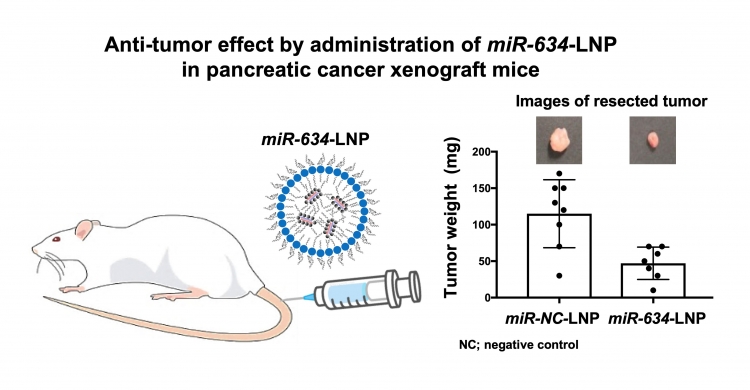Development of anticancer drug with tumor-suppressive <i>miR-634</i> as a drug seed for the nucleic acid therapeutics
—Expectation for clinical application of new nucleic acid-based anticancer drugs
with microRNA for pancreatic cancer—
with microRNA for pancreatic cancer—
Key Points
| ● A type of human microRNA (miR),*1 known as miR-634 was shown to exert a very potent antitumor effect against various types of cancer, including pancreatic cancer. |
| ● An miR-634-LNP formulation was developed to contain synthetic-double stranded miR-634 incorported in LNP (lipid nanoparticles).*2 |
| ● Systemic administration of miR-634-LNP to pancreatic cancer-bearing mice demonstrated successful delivery of miR-634 to the cancer cells to exert antitumor effects. |
| ● The results of this research are expected to lead to clinical application of new nucleic acid-based anticancer drugs with miR. |
A research team led by Associate Professor Jun Inoue, Professor Johji Inazawa, and graduate student, Kentarou Gokita of the Department of Molecular Cytogenetics of the Medical Research Institute, Tokyo Medical and Dental University developed an miR-634-LNP formulation incorporating tumor-suppressive miR-634, which was found to have a significant antitumor effect when administered systemically to mice bearing pancreatic cancer. This research was funded by the Japan Agency for Medical Research and Development (AMED)’s Project for Cancer Research and Therapeutic Evolution (P-CREATE), and the Ministry of Education, Culture, Sports, Science and Technology’s Grant-in-Aid for Scientific Research on Innovative Areas (15H05908) Conquering Cancer through Neo-dimensional Systems Understanding, and the Ministry of Education, Culture, Sports, Science and Technology’s Grants-in-Aid for Scientific Research (18K06954, 18H02688). The results of the research were published online in the international scientific journal, Molecular Therapy-Nucleic Acids on November 26, 2019.
Background of Research
Human microRNA (miR), a functional RNA consisting of approximately 22 bases, negatively controls gene expression by binding directly with the transcripts of the target gene. More than 2,500 miRs are known to exist in humans and to be deeply involved in various life phenomena, such as development, differentiation, cell proliferation and survival, and metabolic regulation. In recent years, tumor-suppressive (TS)-miR therapy has attracted attention as a form of nucleic acid-based drug therapy. However, for this therapeutic strategy to become clinically applicable, it is necessary not only to identify TS-miRs with antitumor effects; the development of an efficient drug delivery system (DDS) capable of delivering TS-miRs in the targeted tumor cells is also urgently required.
We have identified several TS-miRs via human miR library screening and investigated their potential as anticancer nucleic acid-based drugs. Among these, miR-634, a TS-miR which simultaneously and directly suppresses multiple genes related to cellular metabolism, such as maintenance of mitochondrial homeostasis, autophagy, and antioxidative stress (redox), and cell survival, such as anti-apoptosis, has been expected to be useful as a drug seed for the nucleic acid therapeutics.
We have identified several TS-miRs via human miR library screening and investigated their potential as anticancer nucleic acid-based drugs. Among these, miR-634, a TS-miR which simultaneously and directly suppresses multiple genes related to cellular metabolism, such as maintenance of mitochondrial homeostasis, autophagy, and antioxidative stress (redox), and cell survival, such as anti-apoptosis, has been expected to be useful as a drug seed for the nucleic acid therapeutics.
Outline of Research Results
In the present study, we validated the therapeutic potential of LNP-mediated delivery of miR-634 for cancer therapy. First, the sensitivity of miR-634 was assessed to 117 cells lines derived from various cancer types, including pancreatic cancer through introduction into the cell lines using the lipofection method. The results showed a significant decrease in the cell survival rate in 45 of the 117 cell lines (38.5%). Furthermore, miR-634 inhibited the expression of target genes and induced significant apoptotic cell death when introduced into three pancreatic cancer cell lines (BxPC-3, PSN-1, and CFPAC-1).
Next, to deliver miR-634 efficiently to tumor cells in a murine model, an miR-634-LNP was created by incorporating synthetic double-stranded miR-634 into LNP (L021-LNP; provided by Eisai Co., Ltd.). Then BxPC-3 tumor-bearing mice were systemically treated with miR-634-LNP in an experimental manner. The results showed not only efficient delivery of miR-634 into tumor cells and inhibition of expression of target genes, but also a remarkable antitumor effect in the group treated with miR-634-LNP compared to the group with miR-NC (negative control)-LNP (see figure). Moreover, there is no hepatotoxicity in mice treated with miR-634-LNP. These findings suggest that LNP-mediated delivery of miR-634 can potentially be used for cancer therapy.
Next, to deliver miR-634 efficiently to tumor cells in a murine model, an miR-634-LNP was created by incorporating synthetic double-stranded miR-634 into LNP (L021-LNP; provided by Eisai Co., Ltd.). Then BxPC-3 tumor-bearing mice were systemically treated with miR-634-LNP in an experimental manner. The results showed not only efficient delivery of miR-634 into tumor cells and inhibition of expression of target genes, but also a remarkable antitumor effect in the group treated with miR-634-LNP compared to the group with miR-NC (negative control)-LNP (see figure). Moreover, there is no hepatotoxicity in mice treated with miR-634-LNP. These findings suggest that LNP-mediated delivery of miR-634 can potentially be used for cancer therapy.

Significance of Research Results
Unlike molecular targeted drugs, which target a single molecule, the nucleic acid therapeutics using tumor-suppressive miRs are expected to be beneficial due to their characteristics of targeting multiple cancer-related genes. The present study using an animal model demonstrated efficient delivery of miR-634 to tumor cells and anti-tumor effect of miR-634-LNP. This finding is expected to lead to the clinical application of the nucleic acid therapeutics for the treatment of various types of cancer, including pancreatic cancer.
Glossary
*1 microRNA (miR)
miR is a functional RNA consisting of approximately 22 bases that suppresses gene expression by directly binding to the transcripts of the target genes. More than 2,500 types of miR are known to exist in humans, among which tumor-suppressive miRs are promising as a drug seed for the nucleic acid therapeutics.
*2 LNP (lipid nanoparticle)
LNP is a lipid nanoparticle containing ionized lipids and serves as a drug delivery system. LNP incorporating microRNA provides protection from nucleic acid degradation by nucleases in the external environment (blood) and enables stable transportation of the miR to the tumor tissue.
miR is a functional RNA consisting of approximately 22 bases that suppresses gene expression by directly binding to the transcripts of the target genes. More than 2,500 types of miR are known to exist in humans, among which tumor-suppressive miRs are promising as a drug seed for the nucleic acid therapeutics.
*2 LNP (lipid nanoparticle)
LNP is a lipid nanoparticle containing ionized lipids and serves as a drug delivery system. LNP incorporating microRNA provides protection from nucleic acid degradation by nucleases in the external environment (blood) and enables stable transportation of the miR to the tumor tissue.
Article Information
Journal : Molecular Therapy-Nucleic Acids
Article title: Therapeutic potential of LNP-mediated delivery of miR-634 for cancer therapy
DOI:https://doi.org/10.1016/j.omtn.2019.10.045
Article title: Therapeutic potential of LNP-mediated delivery of miR-634 for cancer therapy
DOI:https://doi.org/10.1016/j.omtn.2019.10.045
Researcher Profile

Kentarou Gokita, graduate student
Department of Molecular Cytogenetics, Medical Research Institute
Tokyo Medical and Dental University
Research area: Surgical oncology
Department of Molecular Cytogenetics, Medical Research Institute
Tokyo Medical and Dental University
Research area: Surgical oncology

Jun Inoue, Associate Professor
Department of Molecular Cytogenetics, Medical Research Institute
Tokyo Medical and Dental University
Research area: Tumor biology
Department of Molecular Cytogenetics, Medical Research Institute
Tokyo Medical and Dental University
Research area: Tumor biology

Johji Inazawa, Professor
Department of Molecular Cytogenetics, Medical Research Institute
Tokyo Medical and Dental University
Research area: Tumor biology, human genetics, diagnostic oncology
Department of Molecular Cytogenetics, Medical Research Institute
Tokyo Medical and Dental University
Research area: Tumor biology, human genetics, diagnostic oncology
Contact Information
【Regarding research】
Johji Inazawa, Jun Inoue
Department of Molecular Cytogenetics, Medical Research Institute
Tokyo Medical and Dental University
TEL: +81-3-5803-5820
FAX: +81-3-5803-0244
E-mail:
johinaz.cgen@mri.tmd.ac.jp
jun.cgen@mri.tmd.ac.jp
【Regarding press】
Public Relations Division
Tokyo Medical and Dental University
1-5-45 Yushima
Bunkyou-ku, Tokyo 113-8510
TEL: +81-3-5803-5833
FAX: +81-3-5803-0272
E-mail: kouhou.adm@tmd.ac.jp
Johji Inazawa, Jun Inoue
Department of Molecular Cytogenetics, Medical Research Institute
Tokyo Medical and Dental University
TEL: +81-3-5803-5820
FAX: +81-3-5803-0244
E-mail:
johinaz.cgen@mri.tmd.ac.jp
jun.cgen@mri.tmd.ac.jp
【Regarding press】
Public Relations Division
Tokyo Medical and Dental University
1-5-45 Yushima
Bunkyou-ku, Tokyo 113-8510
TEL: +81-3-5803-5833
FAX: +81-3-5803-0272
E-mail: kouhou.adm@tmd.ac.jp

